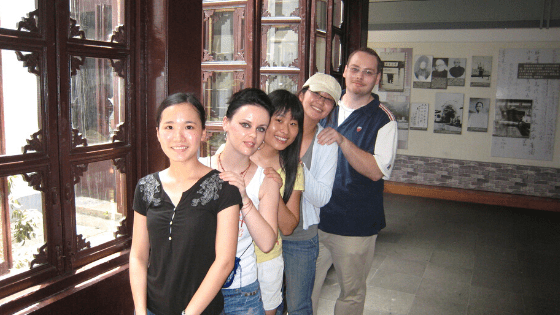Shawn, from Georgia, earned his TEFL/TESOL certification from Bridge and continued on to teach English in China, where he has been spending the majority of his time since 2006. He eventually developed his own company and now produces ESL workbooks and presentations for teachers and students. We spoke to him about his experiences as a teacher, his journey to becoming an entrepreneur, and his thoughts on how the global coronavirus crisis is forcing the TEFL industry to “change and adapt.”
How long have you been teaching?
I jumped into the ESL industry in China in 2006, and I can still remember my first gig. A local ballet school wanted to offer English lessons to the young ladies who were learning to dance. In between their practice sessions, I would teach them English using material I printed out. The lessons were basic, as I believe the girls were not even in their teens and hadn’t been exposed to English very much, and if I am honest, the lessons were probably also quite rubbish, due to my lack of experience at that time.
How did you first get interested in teaching English abroad?
I mentioned that I “jumped into” the ESL industry in 2006, but it might be more accurate to say that I fell into it. Back in 2004, I was on a site looking for a Japanese pen pal, because I had (and still do) a major crush on Japanese culture. However, I had also just watched a movie called Crouching Tiger, Hidden Dragon, and I thought it was marvelous. It sparked my interest in Chinese culture, so I started looking for a Chinese pen pal as well.
I ended up getting in contact with a young lady from Shanghai, and we spent a lot of time chatting online and developing a deep friendship. This eventually blossomed into love, and I made the move to China to be with her. Before meeting her, I didn’t really have any ambition to become a teacher, but what else was a young, inexperienced foreigner to do in 2006’s China?

Why did you choose to get TEFL certified and what was your favorite aspect of the course?
After teaching at a ballet school, I lucked out in August of 2006 with a school in a small city near Shanghai that hired me. I was the fifth member of the foreign teaching staff, and definitely the least experienced. My classes weren’t very good, so I knew that I needed some training. Unfortunately, the school didn’t have any training programs in place to develop teachers.
To make matters worse, by just my second week there, it was just me and one other new teacher. We probably had around 500 students to teach. Talk about being thrown into the fire. With all of these events in mind, I knew that I needed to improve myself quickly, so I ended up looking for an online TEFL course and came across Bridge.
I really enjoyed my online course with Bridge, and I can remember filling a binder with the information I printed out from every module. I read over that binder continuously and immediately tried to put what I was learning into practice in my classes. However, the information that has stuck with me the most prominently pertains to elicitation and CCQing.
Learn more about the teaching strategy Shawn’s referring to here: What is a CCQ?
Since earning your certification, you’ve gone on to manage language schools. How did you end up doing that and how did it compare to teaching?
I spent about four years at my first school in China, and it was a good growing experience. I developed my social skills, learned my style of making lesson plans, became comfortable in front of large groups of people and became more comfortable in my own skin. However, as said earlier, the school didn’t really have any training or development programs. That didn’t really fit with what I wanted. I wanted to continue to grow and develop; I was ambitious.
Moving on up
Eventually, a training school with branches across China decided to take me on. They were very well structured, had clear development and training programs and welcomed foreigners into management positions. I joined this company as a teacher. It was then that I started to try to set myself apart from my peers in terms of identifying my unique selling point. After a few months, I had the answer: PowerPoint presentations.
I enjoy designing presentations, and while this comes in handy with engaging students in class, it also comes in handy with the training staff. I volunteered to do some in-center training and had the good fortune to have an outstanding manager who ran what I was doing up the flagpole. This led to me becoming a supervisor and being a key position in a material development program. The program was successful, and that opened the door for me to enter the company’s management training program and eventually have my own school in Shenzhen.
Preferring managing over teaching
While I think I have been quite successful at teaching and have established a lot of fantastic and long-lasting friendships with my students, management is where my heart is. When you are a manager, you are constantly being faced with new challenges. You have to force yourself to step up and grow. I love being at the wheel, and solving problems, and then finding proactive ways to prevent those problems from ever happening again. As a manager, it really pleases me to be able to make the changes that will have a positive impact on not only my students but also my staff.
You’ve also developed materials for students and teachers. Tell us more about that.
When I started developing PowerPoint presentations, a lot of teachers started coming to me and asking me for help or asking if they could use my presentations in their classes. I was always happy to oblige, but it got me to thinking about why I was becoming the go-to guy for presentations, especially for English Corners, which are large, open classes in training schools, and sometimes universities, where all students are allowed to attend. The answer is that while PowerPoint presentations are not that difficult to make, coming up with ideas sometimes is.
Modules vs. A Series
Most teachers tend to do modular English Corners. Each one is self-contained, thus meaning that the teacher has to start from scratch for the next English Corner. While modular English Corners do have a place, I prefer to develop series.
Creating a series has many advantages. First, you can create a template, which allows you to update the information between each class more easily. Second, a series allows you to refine your style as you teach each class within that series. You learn what works, and what doesn’t, as well as which methods of engagement work best with the students. Finally, a series is standardized, so while the topics in the series might be different, the class flow isn’t. This allows students to know what to expect when they attend that class, which means that they will be better prepared to engage more within that class.
Shawn’s ‘Pros and Cons’ series
That being said, one of my most popular series is The Pros and Cons. (You can check out a sample of the workbook here.) It’s a 25-topic series dealing with issues such as war, arranged marriages, adoption, relationships at the workplace, etc.

Each topic is based on the same PowerPoint template and flows the same way: topic introduction, vocabulary, discussion questions, one or two production activities, and closing questions. I’ve refined this series over five years, and you can check it and other resources out on my website, ESLPPT .

Can you tell us about a memorable experience you’ve had in your TEFL career abroad?
Honestly, I really just can’t settle on one. Since I teach adults primarily, I’ve been fortunate enough to have many of my students become outstanding and long-lasting friends. My best friend is one of my students from when I was in Hangzhou, and she is probably one of the kindest, and most hard-working, people that I have ever met. I am thankful that my career in ESL has granted me the opportunity to meet people like her.

Can you share a classroom or teaching tip that you’ve learned along the way as an educator?
Set the framework
I mentioned elicitation and using CCQs earlier, but the most vital tip I can give any teacher is to “set the framework”. Any time you engage with new students, you need to remember to let them know who you are, what they should expect from you, and what you expect from them. We are operating in environments with people who might not share a common culture with us. This does have the potential to lead to conflict, especially regarding certain topics that might be viewed from wildly different lenses.
Bad teaching habits
I’ve also observed that teachers tend to have a couple of bad habits; the first is that many teachers tend to feed the answers to the students, especially in the ESL industry. More often than not, some of your students in the class will know the answer or being able to discover the answer with a bit of guidance and coaxing. By using elicitation techniques that allow the students to find the answers themselves, you are allowing them to also find their own confidence in using the language.
The second bad habit is asking, “Do you understand?” This is probably the most useless question a teacher can ask because, students will either say they do, even if they don’t because they want to avoid embarrassment, or they may think they understand, but actually not. It is far more informative for the teacher to ask concept checking questions. These are questions that show a student actually understands the subject matter.
As a teacher, how has the coronavirus pandemic affected you? And what impacts have you seen the coronavirus have on the TEFL world overall?
Struggling schools
Regarding the epidemic, the industry has definitely had to change and adapt. I know of one large chain of schools that is really struggling and laying off staff. They were already having a tough time before the coronavirus outbreak. Now they are also going to close several branches in the coming year. My company has also been struggling. However, it seems the staff has stayed on board, with the exception of some foreign teachers who have returned to their home countries. Some smaller companies might not recover and may end up closing, which will further damage the reputation of the industry in China.
The challenges of teaching online
Beyond that, classes obviously have to move online, and there are still many kinks that have to be ironed out in some of the systems. The issue here is keeping students motivated. This is a challenge, especially since a lot of parents may not be pushing the kids to study as much as if they were to attend a brick and mortar school. Combine that with the issue of finding adult students being something of a challenge, as adults are worried about the investment in themselves during this time of uncertainty. This has an impact on me due to my teaching preference.
Read tips for troubleshooting problems when teaching online.
The current job market
It is also worth mentioning that job hunting is a bit of a challenge at this time. There are still offers and interviews, but at a much lower quantity, due to many schools not knowing when they will open again. I am in the process of weighing the offers I do have. I am trying to decide on whether to hold out for more when things clear up or take the best of what is on offer now.
I’ve been stuck in my apartment for a couple of months, and teach online here and there. I also have started leveraging my skills as a material developer and accepted a freelance position developing a course for a school in Shanghai.
What are your future career goals?
For my short-term goals, frankly, I am currently mulling them over. This past year, I’ve taken a step back from management to focus more on what I want to do going forward. I feel it is time to start the next chapter of my life outside of China. As I think over this decision, I am continuing to work on my next workbook. I have also just taken on an online project as a material developer for a school in Shanghai.
In terms of my long-term goals, I wouldn’t mind opening another school, but that’s all about timing and location. Knowing what I know now, I’m sure I could make a good go of it.








